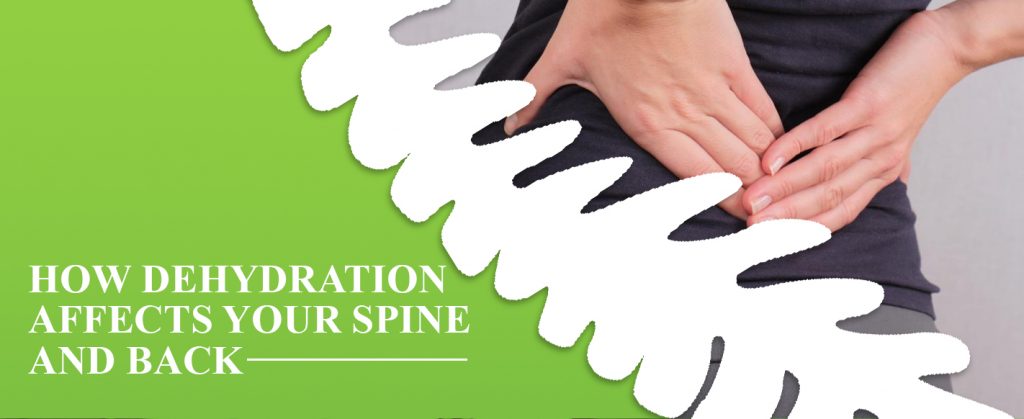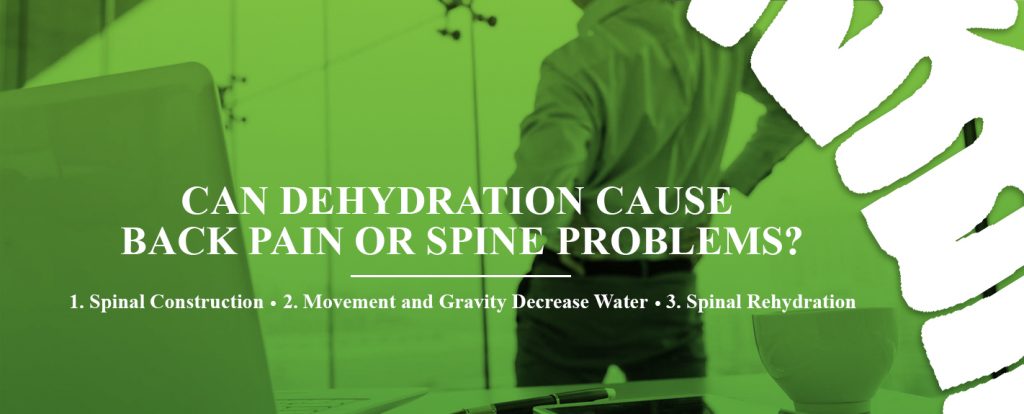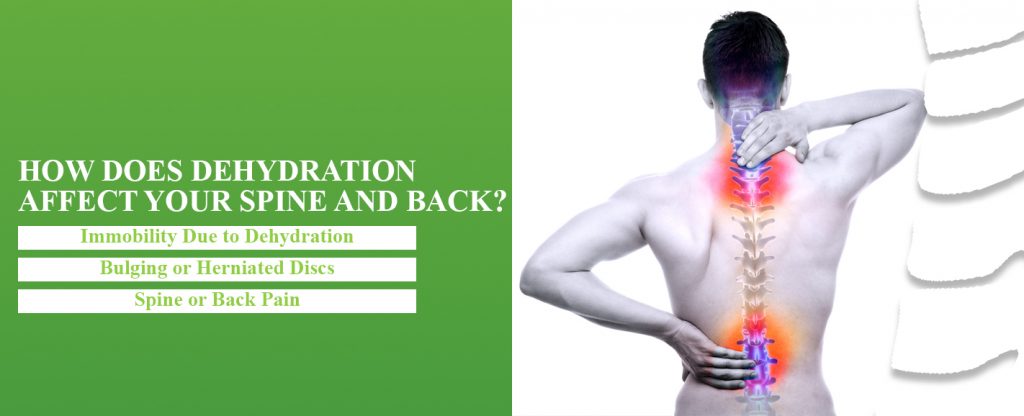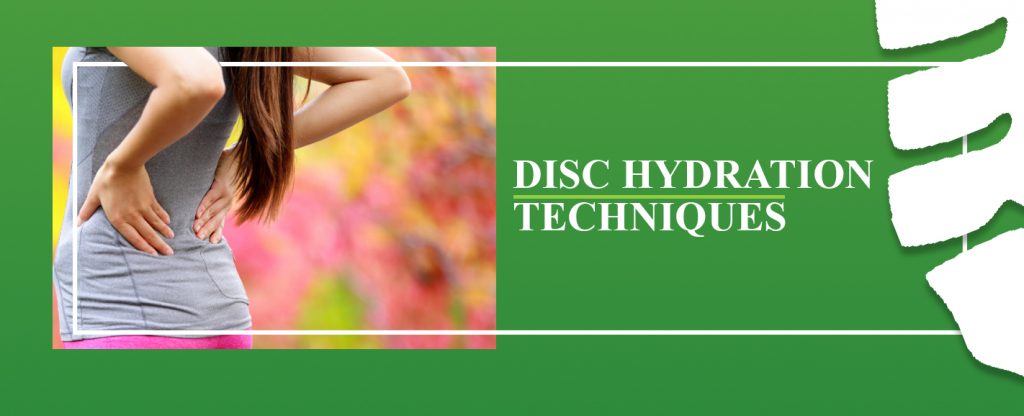This content was medically reviewed by Baher S. Yanni, MD, on December 20th, 2018.
When someone mentions dehydration, thirst, dryness and fatigue come to mind. But back pain and spine problems are unexpected results of dehydration. Water is a significant component of bodily functions, altering the metabolism, skin and energy levels, but it also changes the inner workings of your physiological system, like organs and tissues. The spine and back’s elements hold a surprising amount of water, and a lack of water even impacts their motion and your health. The following explanations give an overview of the connection between hydration and spinal health.
Call today
Can Dehydration Cause Back Pain or Spine Problems?
How dehydration affects your back links directly to its central structural column: the spine. Your spine is a vital element of your health that keeps your back intact. But hydration is a surprising factor that impacts your spine. The makeup of your spine, the impact of movement and the way your body rehydrates all give insight into how your water input changes your ability to move with ease.
1. Spinal Construction
The spine is a column composed of discs, vertebrae and cartilage, and the primary purpose of this structure is to encase the spinal cord. The discs take the brunt of any jarring motions you may perform throughout your daily practices, so the vertebrae do not grind together, providing flexibility and relieving harmful shock. Each vertebra contains liquid or nucleus pulposis, and a cushioned portion of water. The outer layer, the annulus fibrosus, is bendable but sturdy enough to protect the inner substance. However, the discs lose and regain water regularly, which is a natural process. They cyclically reabsorb as exertion happens and you replenish your system with water.
2. Movement and Gravity Decrease Water
As the discs undergo wear and tear, the water loss causes the discs to thin, thus altering the tissue density. Movements like jumping, running, walking and bending all take away some of the fluid in the spinal discs. The pressure from everyday activities leaches the water from the discs, and the weight of gravity presses on the spinal discs, which also takes some water from the stores in the discs. Stress and pressure contribute to degeneration. One effect of the loss of water is a reduction in disc size and an inability to cushion like they once could. Movement becomes difficult when the discs have shrunk enough to stop sustaining the proper distance and connection of cartilage and vertebrae.
3. Spinal Rehydration
For regular exertion and most healthy bodies, the discs rehydrate during the night with the water you’ve consumed. This process is called intradiscal fluid exchange because it replaces the old fluids with new hydration. The tissue in the discs gets replenished when the body rests and can undergo the restorative process. Discs are then plump and have their cushioning qualities again. They become the same size, consistency and shape the vertebrae need for your body to make basic motions.
A good night’s sleep restores your flexibility, but when this degeneration occurs over the years, the gradual bulging results in herniated discs or other painful conditions. Organs are the first place the body directs hydration, so if there is not enough water to meet the needs of the organs and other areas like the spine, these secondary parts will suffer.
Schedule a consult
How Does Dehydration Affect Your Spine and Back?
This explanation of the spine’s functions and the rehydrating process may still leave you asking, “Why do I have to drink enough water if my spine repairs itself?” How dehydration affects your spine comes down to the repair rate. The repair rate of spinal discs differs based on age and health, and habits like proper hydration can strengthen it. If you are dehydrated and your back is taking the majority of the impact, several uncomfortable reactions can take place.
1. Immobility Due to Dehydration
Dehydrated discs in your spine hamper mobility, and this will cause more than back pain if it ends up wearing the spinal discs down and hardening the inner nucleus pulposis. Vertebrae will be closer, hindering the body’s twisting and bending capabilities. Limited movement from this will require you to rest or receive surgery.
2. Bulging or Herniated Discs
Bulging and herniated discs are one of the most painful results of dehydration to the spine. Discs bulge when the outer annulus is damaged or weakened. The bulging of discs points pressure outwardly, which allows vertebrae to scrape against each other. A pronounced force on the discs can herniate them, as well, because dehydrated discs cannot sustain impact and have reduced elasticity. Because the discs, even the outer layer, need additional water to restrengthen, the bulging can occur from lack of continuous hydration.
3. Spine or Back Pain
Back pain can plague individuals who have a gradual wearing on their vertebrae from thinned discs or herniated discs releasing chemical substance on the nerve at the base of the back. Lower back pain happens because of indirect pressure on the nerve root after deterioration has started. Discomfort in the lower back can also stem from mechanical or chemical stimulation of the outer discs.
What Are Signs of Dehydrated Discs?
Watch for a dehydrated disc if you have current back problems or suspect your past hydrating practices may influence your spine health. The symptoms of dehydrated discs are typically an extreme pain in the lower back and numbness in the legs. The following symptoms are additional warning signs.
- Bulging spots on the spine
- Shooting pain through the legs
- Tingling in the legs, especially accompanied by numbness
- Weakness in leg muscles
- Absence of reflexes in the legs
- Issues with pelvic organs
What Dehydration Symptoms Will I Experience?
Dehydration means your body is either not taking in enough water, or it is expelling too much. Thirst, according to Baylor College of Medicine, is not the beginning of dehydration, but proof you already lack too much water. The decreased intake of water can be involuntary, due to illness or accidents, but voluntarily lacking sufficient hydration is avoidable.
To combat back and spine pain, observe these symptoms to make sure you remain hydrated. Hot weather is a typical cause of dehydration, which expels more of your water content than you can take in due to sweat and exertion. Alternate reasons for dehydration are illness or medical conditions. Some illnesses, like diarrhea or vomiting, will leave you expecting dehydration, but others will affect you more subtly. Watch for these factors, so you do not let your body lapse into more severe conditions.
1. Weakness
If you or a loved one are experiencing weakness along with additional signs of dehydration, bring some water to the system to rehydrate. Visual, psychological and cognitive functions suffer when enough water, at least 2 percent of body weight, gets expelled from dehydrating factors. If muscles have lost their typical strength, it indicates the body needs to replenish its water. If the lower back and legs are weak, the dehydration could be central to the spine and back.
2. Dizziness
Because mental state is only one part of the body dehydration disrupts, physical functions like balance and steady vision may seem to fit into the mental status category. Lightheadedness and dizziness are related to blood pressure. Dizziness often comes from dehydration because blood levels dissipate and not enough blood makes its way to the head.
3. Change in Mental Status
A similar phenomenon to dizziness, changes in mental state like confusion or irritability occur when the neurons in the brain identify the body’s low levels of water. Mood changes are common with dehydration, but even anxiety and tension plague those who need an extra dose of hydration. The change in attitude warns the individual and those around them that something is unbalanced in their system.
4. Dark Urine
Dehydration is obvious in the urine color, because the contrast from purely hydrated urine — clear and colorless — to dehydrated urine — dark yellow or orange — is difficult to overlook. Kidneys conserve water when the body is not receiving enough, and this concentration of urine means the color will be darker, displaying the extent of dehydration. Occasionally, colored urine means nutrients, minerals or vitamins are being expelled or a different substance is coloring it and dehydration is not the problem. Brown urine indicates a more serious issue with your kidneys, so see a physician if this is the case.
5. Low Blood Pressure
In the past, the medical field thought water did not affect blood pressure, but recent studies show basic hydration raises blood pressure to a healthy level. Even in patients without proper baroreflexes, which balance blood pressure levels, water contributed to the management of their blood pressure. Dizziness, as discussed previously, is one result of low blood pressure. Fainting is another common response, but preparing for strenuous activity by drinking water reduces the chance of fainting.
6. Dry Skin
When you are dehydrated, your skin will become dried out, because water constitutes 30 percent of the skin’s makeup. Weather, genetics and diet may be why your skin is dry, but if other dehydration signs are present with dry skin, it’s time to rehydrate. Also, a skin turgor test helps you judge the hydration level of your skin. Pinch and raise your skin, then assess how long it took for your skin to return to its original state.
7. Rapid Breathing
Everyone expels water each day through daily behavior — even breathing. However, when dehydration affects people, their respiration system cannot operate properly. Drinking water removes secretions or mucus blocking and lining the airways, as well. But, dehydration’s effect on the body’s blood flow restricts the availability of oxygen. Those who are dehydrated enough to lose significant oxygen can go into shock.
8. Rapid Heartbeat or Irregular Pulse
A rapid heart rate and palpitations are also results of dehydration. Connected to both the lack of oxygen and blood flow, heart rates may be extremely high or even barely detectable. Usually, fast heartbeats result from a hot climate, but dehydration mainly causes rapid heartbeats from compensating for the lack of blood making its way to the vital parts of the body. Irregular heartbeats and palpitations happen due to the disruption in blood flow.
9. Sunken Eyes
Visual signs of dehydration include sunken eyes, and the eyes also will not produce tears and become dry. The strain of dehydration on the eyes will eventually cause them to look more and more tired. At some point, they may even appear sunken, but children experience this more often than adults do. Fatigue and irritation also contribute to the wear on eyes during dehydration. Lack of protection and bodily functions hinders the eyes’ ability to maintain normal conditions.
10. Fatigue
Substantial exhaustion or fatigue are signs your body does not have the proper energy that water supplies. Loss of appetite and other halted bodily operations show that your body is conserving its energy and resources because it has reached such a low level of hydration. You may notice fatigue in your mood, but overall exhaustion, especially unwarranted, is a warning that your water intake needs to increase.
11. Dry Mouth
Many parts of the body lose water when you are dehydrated because water is primarily for the vital organs that sustain life. So, the mouth becomes dry and even sticky with extra mucus. A dry mouth may increase your thirst, and if you notice these symptoms, you need to hydrate. These are signs of mild dehydration, but they could become more dangerous cases.
Disc Hydration Techniques
If you are experiencing back problems, your water intake could be the issue, and even if it is not the main issue, hydration can reduce the discomfort you are going through. However, medical professionals treat any serious back and spine issues that stem from dehydration. Although degenerated discs cannot rejuvenate themselves, the medical field has found other techniques to stimulate hydration. Disc hydration techniques are one way that can rehydrate the discs by distracting or stabilizing the intradiscal pressure. If you have herniated discs, ask your physician about this option to promote the right conditions for rehydration in the spine.
Schedule a consult
Tips to Stay Hydrated
Stay hydrated to protect your back and spine from serious pain down the road. Follow these practices to help your body regularly replenish and fortify the discs in your spine so that your back remains healthy.
- Eat fruits and vegetables, because they also contain water.
- Check your urine.
- Keep your intake to 30 to 50 ounces or 1 to 1.5 liters each day.
- Gradually drink water throughout the day.
- Limit diuretics like coffee, tea, alcohol and sodas because they cause you to rapidly lose water.
- Drink more water when you exercise or if you are in a hot climate.
Relieve Your Pain and Revive Your Life
If you are experiencing back pain or spine problems, seek treatment at a facility with an honest environment, clear and understandable treatment options and the most effective procedures for your pain. At the Metropolitan Pain & Spine Institute, we offer this, and our professional and personable staff strive to find the right care path for you. We are a leader in the least invasive spine procedures and practitioners of techniques such as endoscopic discectomy, endoscopic facet rhizotomy and spinal cord stimulation.
Contact us today for more information on our spine procedures or to make an appointment.
Schedule a consult
Resources
- https://www.britannica.com/science/vertebral-column
- https://www.ncbi.nlm.nih.gov/pmc/articles/PMC3591832/
- https://www.researchgate.net/publication/267614385_Intra-_and_Extrafibrillar_Fluid_Exchange_in_the_Disc
- https://commons.und.edu/cgi/viewcontent.cgi?article=1473&context=pt-grad
- https://www.health.harvard.edu/staying-healthy/the-importance-of-staying-hydrated
- https://www.bcm.edu/news/sports-medicine/thirsty-you-are-already-dehydrated
- https://www.unm.edu/~lkravitz/Article%20folder/WaterUNM.html
- https://today.uconn.edu/2012/02/even-mild-dehydration-can-alter-mood/#
- https://deohs.washington.edu/pnash/sites/deohs.washington.edu.pnash/files/documents/Heat_Illness_UrineChart%28USARMY%29.pdf
- https://www.mc.vanderbilt.edu/reporter/index.html?ID=9047
- https://www.bbc.com/future/story/20120903-is-drinking-water-good-for-skin
- https://www.health.harvard.edu/heart-disease/skipping-a-beat–the-surprise-of-palpitations
- https://www.ncbi.nlm.nih.gov/pmc/articles/PMC5481589/
- https://spineina.com/contact/














Does water in back bone causes death
Hey there! Feel free to give us a call so we can answer any questions for ya!
Hello,
I have slip disc problem between L3 L4 & L4 L5
So My question is how much litre water i should drink?
Hi there! If you want to give us a call we can chat about this more!
Hi,
Great article. I am having severe back pain. I have degenerative disc disease. I’m wondering if dehydration played a role in causing my spine issues. I drink too much coffee, which I think dehydrates me, and I don’t drink as much water as I should. Do you think drinking 1.5 liters of water a day will help restore my spine to a healthier place? Thank you.
Hello! We’d like to learn more about your specific condition in order to most accurately advise! Feel free to make a virtual appointment or give us a call.
Hi there, just wanted to say thank you for such a useful, detailed article! I’ve just googled this after having an MRI. This is the first time I’ve seen so many of my symptoms presented (since MS has now been ruled out via the scan!!) so it leads me to think I need to fix my back! I will drink much more water and less tea now, and probably see a chirpractor as well. Thanks again.
Happy to help, Jill! If you have any questions, please let us know!
Jill, I am just a normal person who had a back problem, but if you’re getting the symptoms mentioned:
Shooting pain through the legs
Tingling in the legs, especially accompanied by numbness
Weakness in leg muscles
Absence of reflexes in the legs
Issues with pelvic organs
It could become a medical emergency, look up cauda equina. Know the signs. Hopefully things are ok with you, but if you are having those symptoms you need to find someone who will do a proper assessment.